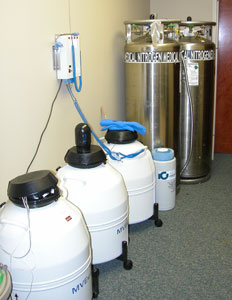Sperm Cryopreservation Information (Sperm Freezing)
 Description of Procedure: Sperm can be successfully frozen, stored and thawed at a later date. However, not all sperm freeze and thaw well. There can be wide variations in the percentage of sperm that survive the freeze and thaw process. It is possible that no sperm will survive the freeze and thaw process. Sperm samples are kept in liquid nitrogen tanks until thawing is performed. Sperm can theoretically be stored for years and still be viable after thawing. There is a fee for freezing the sperm which includes the first year storage. After the first year, there is an annual storage fee for keeping the sperm frozen.
Description of Procedure: Sperm can be successfully frozen, stored and thawed at a later date. However, not all sperm freeze and thaw well. There can be wide variations in the percentage of sperm that survive the freeze and thaw process. It is possible that no sperm will survive the freeze and thaw process. Sperm samples are kept in liquid nitrogen tanks until thawing is performed. Sperm can theoretically be stored for years and still be viable after thawing. There is a fee for freezing the sperm which includes the first year storage. After the first year, there is an annual storage fee for keeping the sperm frozen.
Benefits of Procedure: Sperm cryopreservation provides you with options for various circumstances. Some men store sperm prior to undergoing chemotherapy for use at a later time. Other men store sperm to have as a backup if they are unable to be present or unable to produce a fresh semen sample for a given fertility procedure.
Risks of Procedure: Sperm may not survive freezing and thawing. Thawed sperm may not be adequate for establishing a pregnancy either by insemination, by in vitro fertilization (IVF) or by intracytoplasmic sperm injection (ICSI). Mechanical failures may occur with the freezing equipment that would render the sperm non-viable.
While current data indicates that there is no increase in birth defects or chromosomal abnormalities in children born from frozen sperm, it is possible that such a problem may occur.
What happens to the frozen sperm: There are potential options for your frozen sperm. Please consider these options carefully.
- Sperm may be thawed when ready to use in an attempt to achieve a pregnancy.
- Sperm samples can be destroyed upon request.
- Sperm samples can be destroyed upon your death.
- Sperm samples can be saved after your death for your spouse to use to achieve a pregnancy.
